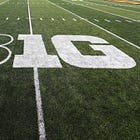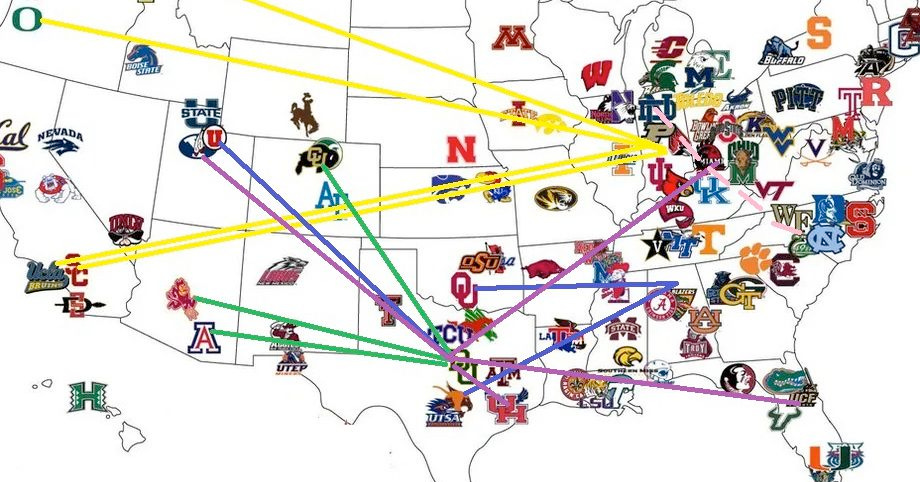Dear Mr. Fantasy
What does college football become now?
This is Throwbacks, a newsletter by me, Michael Weinreb, about sports, history, culture and politics, and everything in-between.
If you like what you read, please click the button below, join the mailing list for FREE and share, on social media or through e-mail or however you feel comfortable sharing.
And if you’ve been reading for a while, please consider a paid subscription to keep this thing going—you’ll also get full access to the archive of over 175 articles, like this one:
I.
Today, I’m going to break from our usual format and share a little secret with you. This secret is not racy or shameful or even very earth-shaking, but it involves a weird proclivity that I share with more than a dozen other friends and acquaintances, several of whom I have not seen in years, and a few who I never actually met in person.
We all know how strange this thing is; in fact, we spend nearly as much time discussing its strangeness as we do actually engaging in this activity. We say to ourselves every year, Why are we doing this, and yet when I ask anyone if they wish to drop out, we nearly all just keep on going with it.
I am speaking of my college fantasy football league.
Perhaps you were not aware that college fantasy football exists. Perhaps did not know that true college fantasy football—not the homogenized daily fantasy or pick ‘em versions available on certain more mainstream websites—has, in fact, existed for over a decade, administered by a single fantasy-sports website that appears to be run by a handful of Canadians, most likely working out of a warehouse in Medicine Hat with dial-up Internet. I presume they cannot believe that there are degenerates like us who are willing to shell out over a hundred dollars merely to access the software that allows us to play a pretend version of a sport that only exists at this level in America, but as long as the money keeps rolling in, they will accommodate us.
As with many odd inclinations, I cannot remember exactly how I discovered the concept of college fantasy football. But as soon as I did, I started a league. In fact, I became the commissioner of this league. And the thing we all soon came to understand is that college fantasy football was absolutely nothing like NFL Fantasy Football.
In the NFL version of fantasy football, your draft will essentially come to define your season; in college fantasy, where the waiver wire is unbelievably massive, you may wind up turning over nearly all of your team over the course of a season, so most people don’t even bother to show up for the draft. In the NFL, you know who the stars are, and you’re all chasing a handful of them; in college fantasy football, the champion is often determined by a waiver-wire pickup of a receiver from Louisiana Tech who catches 136 passes and then goes straight to graduate school in ophthalmology. Information is sparse and requires old-fashioned legwork; on occasion, I find myself digging deep for local newspaper coverage about a Coastal Carolina running back’s toe injury.
College fantasy football the way we play it is utterly random and highly specialized and entirely unique. In a world where betting opportunities are ubiquitous, it has never really caught on, and honestly, I hope it never really does, because it feels like our little secret. For those of us who keep coming back to it, year after year, it’s one of the last niche refuges we have left.
II.
A handful of college football games are being played this weekend. The season is here, and I am never quite ready for this moment when it arrives, but I am especially not ready this year, because everything seems so utterly skewed. This morning, I read about the trend of college football programs hiring general managers in order to handle name, image and likeness issues; I read the claims of a former Colorado assistant coach, who says he lobbied Saudi Arabia’s Public Investment Fund in order to raise money for the program. As the legendary Cincinnati columnist Paul Daugherty wrote, this is all very confusing, and it feels as if we’ve missed out on some big secret that all the cool people are in on; it’s reminiscent of the line in the movie Diner when a confused Mickey Rourke (and when is Mickey Rourke not confused) utters, “What fucking Chisholm Trail?”
I am never prepared for college football season to arrive, but I feel particularly unprepared for this college football season. Because I do not report on this sport on a regular basis anymore, I do not know who anyone is or where anything is anymore. I do not know for certain which teams are in the Big 12 or the SEC; there are quarterbacks who I presume play for one team who have transferred twice since then. Everything feels like it’s moving faster and faster and faster, and part of it is just me getting older, but part of it is that college football has changed more radically over the course of the past decade than almost anything else in American life. Which is crazy, because for decades—for over a century—college football stubbornly resisted any kind of change at all.
III.
I don’t want to be that guy who sits around and laments an inevitable future, but I also understand where Daugherty is coming from, because there are more and more things happening that I simply feel unprepared to process all at once. I thought about this as I read Charlie Warzel’s Atlantic piece about self-driving cars circling a parking lot in San Francisco, and how those cars still feel like a novelty but are slowly becoming an afterthought around these parts where I live, and how the future just sneaks up on us until it fades into mundanity.
Those of us who love college football always kind of viewed it as our own weird little secret. Sure, it was the second most-popular sport in America, but there were (and are) a lot of people who regarded it with skepticism, if not outright contempt. College football, to them, either represented an America they’d rather not know at all, or it represented a lesser iteration of professional football. It’s always been a sport that’s been easy to condescend to; for decades, back when The New York Times actually covered sports, they often covered college football as if they were spelunking into a foreign land.
I don’t know what happens now, as this sport edges closer to professionalism, and as it (rightfully) becomes huge business with a sprawling playoff, and as it becomes more institutionalized and regimented than ever before. But honestly, I hope it never becomes as ubiquitous or homogenized (or frankly mundane) as professional football, and that it somehow maintains its weird indie-rock/John Waters/Sam Peckinpah spirit. I hope, in ten years, that me and my friends and my random acquaintances are still some of the only people around who are playing college fantasy football. Because this is our Chisholm Trail, and I happen to like the fact that it is still so wide-open and so beautiful and so completely difficult for strangers to find their way around.
This newsletter is a perpetual work in progress. Thoughts? Ideas for future editions? Reply directly to this newsletter, contact me via twitter or at michaeliweinreb at gmail, or leave a comment below. If you enjoyed this newsletter, please join the list and share it with others or consider a paid subscription.




Trevor is an interesting man. Can't wait for the tell-all